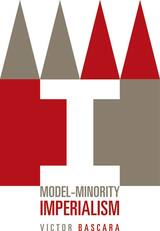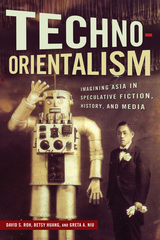2 books about Bascara, Victor

Model-Minority Imperialism
Victor Bascara
University of Minnesota Press, 2006
At the beginning of the twentieth century, soon after the conclusion of the Spanish-American War, the United States was an imperialistic nation, maintaining (often with the assistance of military force) a far-flung and growing empire. After a long period of collective national amnesia regarding American colonialism, in the Philippines and elsewhere, scholars have resurrected the power of “empire” as a way of revealing American history and culture. Focusing on the terms of Asian American assimilation and the rise of the model-minority myth, Victor Bascara examines the resurgence of empire as a tool for acknowledging—and understanding—the legacy of American imperialism. Model-Minority Imperialism links geopolitical dramas of twentieth-century empire building with domestic controversies of U.S. racial order by examining the cultural politics of Asian Americans as they are revealed in fiction, film, and theatrical productions. Tracing U.S. economic and political hegemony back to the beginning of the twentieth century through works by Jessica Hagedorn, R. Zamora Linmark, and Sui Sin Far; discourses of race, economics, and empire found in the speeches of William McKinley and William Jennings Bryan; as well as L. Frank Baum’s The Wonderful Wizard of Oz and other texts, Bascara’s innovative readings uncover the repressed story of U.S. imperialism and unearth the demand that the present empire reckon with its past. Bascara deploys the analytical approaches of both postcolonial studies and Asian American studies, two fields that developed in parallel but have only begun to converge, to reveal how the vocabulary of empire reasserted itself through some of the very people who inspired the U.S imperialist mission.Victor Bascara is assistant professor of English and Asian American studies at the University of Wisconsin, Madison.
[more]

Techno-Orientalism
Imagining Asia in Speculative Fiction, History, and Media
Roh, David S.
Rutgers University Press, 2015
What will the future look like? To judge from many speculative fiction films and books, from Blade Runner to Cloud Atlas, the future will be full of cities that resemble Tokyo, Hong Kong, and Shanghai, and it will be populated mainly by cold, unfeeling citizens who act like robots. Techno-Orientalism investigates the phenomenon of imagining Asia and Asians in hypo- or hyper-technological terms in literary, cinematic, and new media representations, while critically examining the stereotype of Asians as both technologically advanced and intellectually primitive, in dire need of Western consciousness-raising.
The collection’s fourteen original essays trace the discourse of techno-orientalism across a wide array of media, from radio serials to cyberpunk novels, from Sax Rohmer’s Dr. Fu Manchu to Firefly. Applying a variety of theoretical, historical, and interpretive approaches, the contributors consider techno-orientalism a truly global phenomenon. In part, they tackle the key question of how these stereotypes serve to both express and assuage Western anxieties about Asia’s growing cultural influence and economic dominance. Yet the book also examines artists who have appropriated techno-orientalist tropes in order to critique racist and imperialist attitudes.
Techno-Orientalism is the first collection to define and critically analyze a phenomenon that pervades both science fiction and real-world news coverage of Asia. With essays on subjects ranging from wartime rhetoric of race and technology to science fiction by contemporary Asian American writers to the cultural implications of Korean gamers, this volume offers innovative perspectives and broadens conventional discussions in Asian American Cultural studies.
[more]
READERS
Browse our collection.
PUBLISHERS
See BiblioVault's publisher services.
STUDENT SERVICES
Files for college accessibility offices.
UChicago Accessibility Resources
home | accessibility | search | about | contact us
BiblioVault ® 2001 - 2024
The University of Chicago Press









